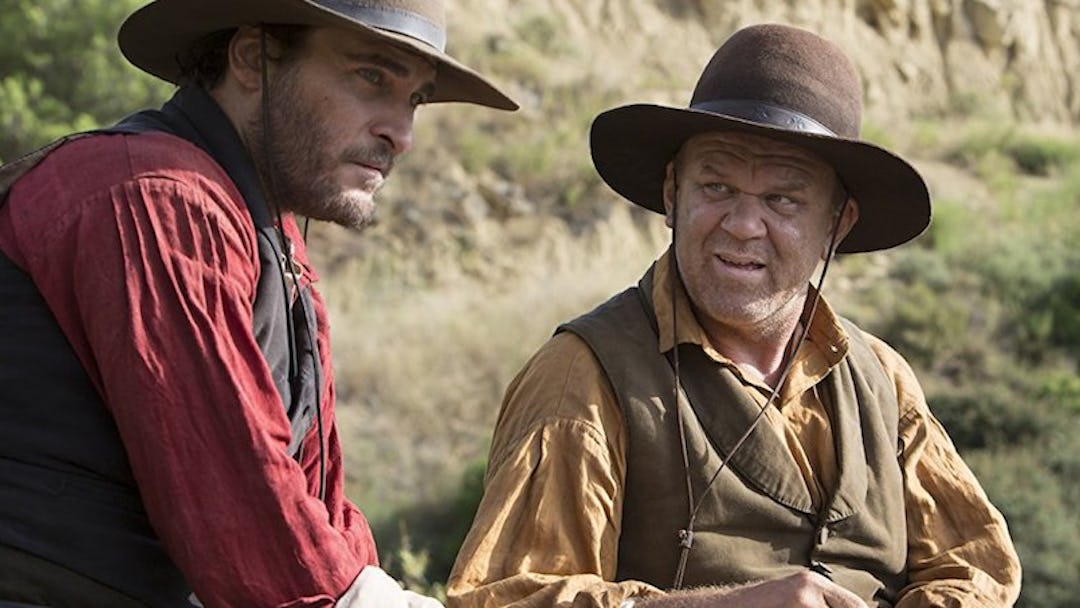On the wonderful audio commentary track to his breakthrough movie Boogie Nights, Paul Thomas Anderson has this to say about John C. Reilly, who plays the supporting role of Dirk Diggler’s best buddy Reed Rothchild: “John C. Reilly is probably one of my favorite actors… Maybe he sucks in this movie, I don’t know. And I don’t know, maybe he’ll suck in the next movie but it’s all good to me, and I just can’t get enough of him.” Anderson first saw Reilly in Casualties of War, the 1989 Vietnam drama that marked the actor’s film debut, and from then on, Anderson recalls, he just wanted to meet Reilly. “Maybe someone else would wanna meet Robert De Niro or Tom Hanks or something,” he admits. “I wanted to meet John C. f*ckin’ Reilly, and have him be my best friend and in every one of my movies, and now I have it.”
Reilly wouldn’t end up in all of Anderson’s movies – in fact, his last appearance in a PTA picture was his shattering performance in Magnolia, as Officer Jim Kurring, the heartbreakingly earnest cop who falls in love with a deeply broken drug addict (Melora Walters), a relationship that seems to actually warrant the use of Aimee Mann’s “Save Me,” especially since either of them could be the one singing it.
(Annapurna Pictures)
The career he’s had, in parallel to Anderson’s, is a peculiar one, admirably low-key and wildly unpredictable. He was nominated for an Oscar, for his delicate supporting work in Chicago; around the same time, he was wonderful in a similar role in Miguel Arteta’s The Good Girl. He popped up in Robert Altman’s last movie, A Prairie Home Companion, and in Lynn Ramsay’s We Need to Talk About Kevin. But between those prestige projects, he contributed enjoyable supporting work to big movies like Kong: Skull Island and Guardians of the Galaxy, co-starred in broad Will Ferrell/Adam McKay/Judd Apatow comedies like Talladega Nights and Step Brothers, and fronted one of his own, Walk Hard. And he did a lot of very strange work with Tim & Eric (as though there were any other kind, with them). He doesn’t do many interviews, or seem interested in big Oscar bait roles. He’ll just occasionally play the lead in a small independent film like Cyrus or Terri, and remind you of the specific quality no one else has, that ability to be awkward, warm, and enigmatic, all at once.
His performance in Jacques Audiard’s darkly funny – and often deeply disorienting – adaptation of Patrick DeWitt’s novel The Sisters Brothers captures all of those qualities, and more. He stars as Eli Sisters, one half of the title pair of for-hire gunslingers in the American West, circa 1851; the other half is Charlie (another firebomb of a Joaquin Phoenix performance). They spend most of their time running missions for “The Commodore,” a rich and powerful so-and-so who just has the worst damn luck with people running off with his money, so he sends the Sisters Brothers out after them.
One of the best qualities of Audiard’s work is that, although he maintains his sky-high quality from one film to the next, you’d never guess that A Prophet and Rust and Bone and Dheepan and this film were made by the same guy. He seems to shed the style and subject of each picture like a skin, worn for a while and then tossed away; this time, he’s doing a Western (as every director worth their salt seems to hope to), but with splashes of a road movie and a Horace Greeley-style adventure tale thrown in.
(Annapurna Pictures)
So Audiard meanders through the frontier, engagingly, not only with Reilly and Phoenix, but with Jake Gyllenhaal and Riz Ahmed as the men they’re tracking. The filmmaker treats them like a pair of double acts, playing off each other’s energy and idiosyncrasies, and each actor gets a chance to shine. But the best moments belong to Reilly, funny and touching as a sensitive man of the gun who wants to be better, smarter, and more understanding, if he could just get his damn fool brother to settle down. And Phoenix and Reilly are thus particularly well matched; the more Reilly bares his soul, the more we realize how delicate and sensitive they both are, how easily they hurt each other’s feelings, and ease each other’s pain.
It’s a lovely performance, tender and offhandedly funny, the portrait of a man who’d probably rather be doing anything else, given the choice (which he apparently wasn’t). And if there’s any justice, it will finally get people to acknowledge, a bit more openly, that John C. Reilly is a marvelous actor who simply doesn’t work the way most of his contemporaries do – or as much as any of us would like.
“The Sisters Brothers” is out Friday in limited release.
